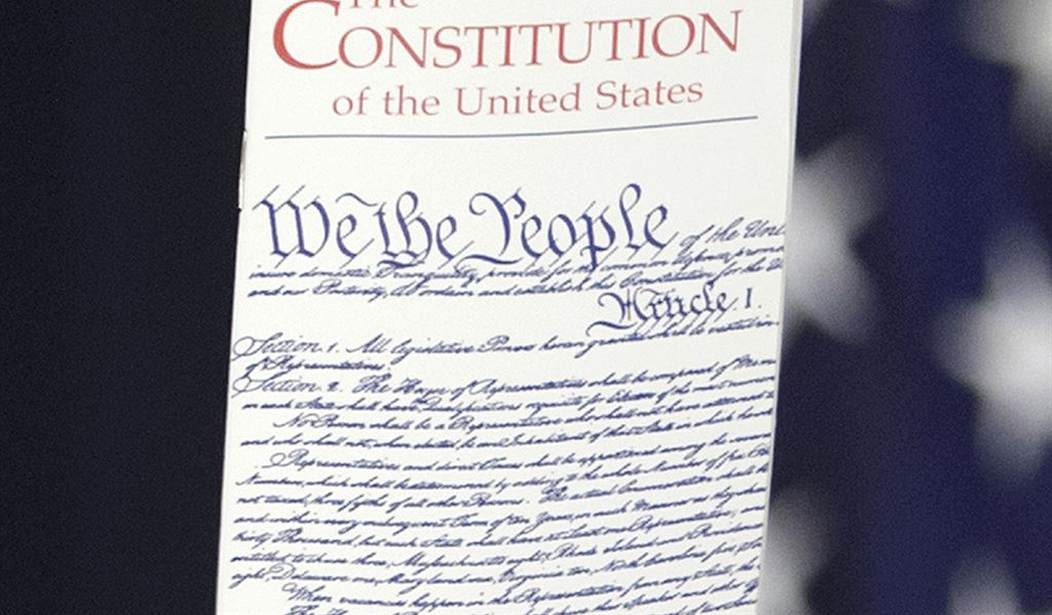Earlier this week, news broke that the National Archives had added a “potential harmful language warning” to the United States Constitution and other founding documents.
The Declaration and the Constitution contain no racist or otherwise harmful language. The Constitution is only harmful to tyrants and those who want to be tyrants, so such a warning makes no sense.
Earlier this year, the National Archives convened a panel on institutional racism in the wake of George Floyd’s death in police custody. That panel insidiously found that America’s founding documents are not “Charters of Freedom,” which flies in the face of the facts of the past few centuries. The founding period was far more complex than simple-minded woke ideology takes into account. The Constitution, as escaped slave Frederick Douglass said in his “What to the Slave is the Fourth of July” address (1852), is a “GLORIOUS LIBERTY DOCUMENT.” Douglass noted that the Declaration and the Constitution do not preserve slavery, but rather, they set the destruction of slavery, a foul institution that had existed worldwide for millennia and still legally exists in parts of the world outside the United States, in motion. By adopting modern woke criticisms of the founding fairly uncritically, and omitting the context, constraints, and debates of the founding period and the decades leading up to the Civil War, the National Archives did an injustice to history and to the founders and did its part to discredit and weaken the United States, the first nation built on ideals and individual liberty as opposed to geography or ethnicity.
So it hasn’t earned the benefit of the doubt. In fact, NARA’s actions raised suspicions. The warning people noticed this week did not help.
The warning that has been reported this week is in place on the Constitution, the Declaration of Independence, and other documents on the NA website. You can see it for yourself here on the Constitution page. It’s linked in the blue bar at the top of the page. But notice that it’s not embedded in the page itself, it’s nestled under the masthead graphics, between that and the content. As you click through other pages throughout the Archive website, the warning is present.
I emailed the National Archives about this on Wednesday, asking:
Can you tell me when and why NARA added the “potentially harmful language warning” to the US Constitution, Declaration of Independence, and other founding documents? Can you point me to specific language in any of them that merits such a warning? How do you expect visitors to your website to react to such a warning being affixed to the Constitution, the foundational document of the United States system of governance?
The National Archives replied later Wednesday.
The harmful language alert is not connected to any specific records, but appears at the top of the page while you are using the online National Archives Catalog (https://catalog.archives.gov/
). The warning is placed there because original historical records may contain language that is racist or may reflect outdated, biased, offensive, and possibly violent views and opinions.
To learn more about why the alert about harmful language appears in our Catalog, please go to https://www.archives.gov/
research/reparative- description/harmful-content Thank you for contacting the National Archives. We hope this information is helpful.
Is the first statement true? You can use the search bar at the top of the page to look up anything in the site’s content. I searched out “Teapot Dome” to retrieve records related to that scandal. The return page has the warning affixed to the top.
Search “Rough Riders” — Teddy Roosevelt’s famous Texas-trained unit that fought in Cuba — and you’ll still see the warning.
Search “Bill Clinton” and the “potentially harmful language” warning is present. The XXX president undoubtedly deserves a warning label, but perhaps not this one.
Search “football.” The warning is still there.
“Susan B. Anthony”? Yep.
“Coca Cola”? Also yes.
NARA’s answer is factual. The warning is not affixed to the Constitution or any particular document. It’s part of the site’s design and is present throughout the site.
Recommended: NASA’s Next-Gen Cosmic Explorer James Webb Space Telescope Gets Ready for Flight
The question is, is the warning necessary, and could the National Archives have approached it differently? The National Archives website has been fine without any warnings for decades. It was evidently added as a response to woke sensitivities. It should not be affixed to the Constitution, the Declaration, or other founding documents. As NARA can now see, placing the warning in the manner that it has is highly misleading and fosters more suspicion that the National Archives is becoming a political entity that is in opposition to the founding of the United States. It does seem to be a first step, along with its “Charters of Freedom” finding, to move in a woke direction, embracing a simplistic and toxic ideology that assaults the United States at its foundation while also ascribing collective guilt upon millions. Collective guilt is one of history’s most pernicious and dangerous forces. You can look that up on the National Archives website in any number of ways. The National Archives should not go anywhere near ascribing collective guilt to anyone. That is not its job, and doing so is extremely dangerous to the country.
The warning seems to have been added in July 2021, during the ongoing moral panic and after NARA released its report finding that America’s founding documents, which are charters of freedom, are not charters of freedom. The evidence — the United States is a free country that has moved from colonial rule under monarchy toward more individual freedom over the centuries until the past couple of years or so as woke ideology and cancel culture have come to dominate — contradicts NARA’s political finding. That finding contributes to the suspicion millions of Americans now have toward the National Archives, an institution that ought to be as apolitical as possible. When people looked up the Constitution on the National Archives website and saw the warning, their reaction was a natural one based on the suspicion NARA has created for itself.
If it wants to ease that suspicion, NARA should remove the warning and convene a new panel that is not stacked with woke congressional staff and activists, but true historians of real merit, and start over on its “Charters of Freedom” investigation. It politicized and botched its first attempt, losing the trust of millions of Americans and damaging our nation at the same time.









Join the conversation as a VIP Member